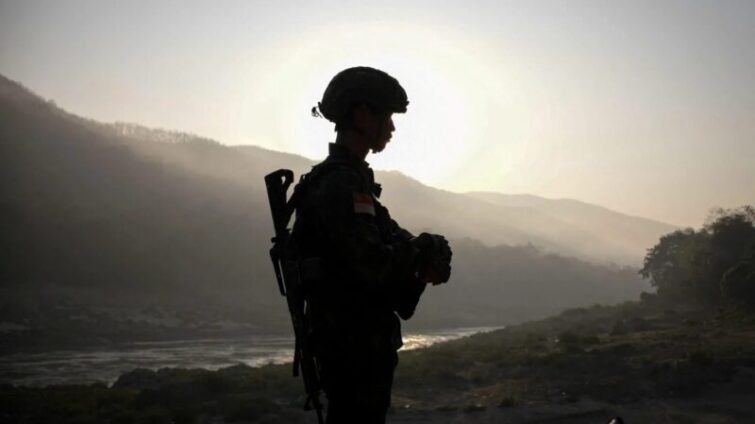The last time Chaw Su saw her husband was in March when he was forcibly conscripted to fight for the army in Myanmar's civil war.
Four months later, she found out he had been killed at the frontline.
"We were always poor and struggled," she says. "But life was much more bearable with him."
The 25-year-old widow, who had depended on her husband as the breadwinner, now has three young children to care for.
*Names have been changed to protect the sources' identities.
In February, Myanmar’s military regime, known as the junta, announced compulsory conscription, meaning all men aged 18 to 35 and women aged 18 to 27 would be forced to serve for up to two years.
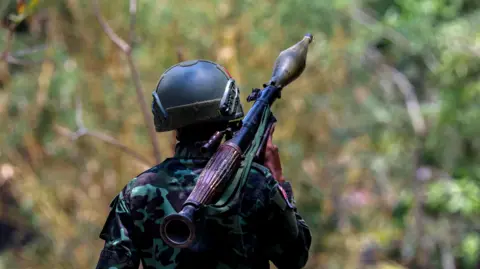
Since launching the 2021 coup that toppled Aung San Suu Kyi's democratically elected government, the junta has faced an uprising on multiple fronts - including from volunteer People’s Defence Forces (PDFs) and ethnic armed groups. That uprising has since escalated into a full-blown civil war.
Last year marked a turn of the tide, as the junta saw a fresh wave of attacks from insurgents that have since pushed the military government to breaking point. As a result, up to two-thirds of the country, which has had decades of military rule and repression, fell under the control of resistance groups.
The increasingly embattled junta responded in part by pushing forward with mandatory conscription, despite warnings from experts that it could exacerbate the nation’s civil conflict. The first training began in April.
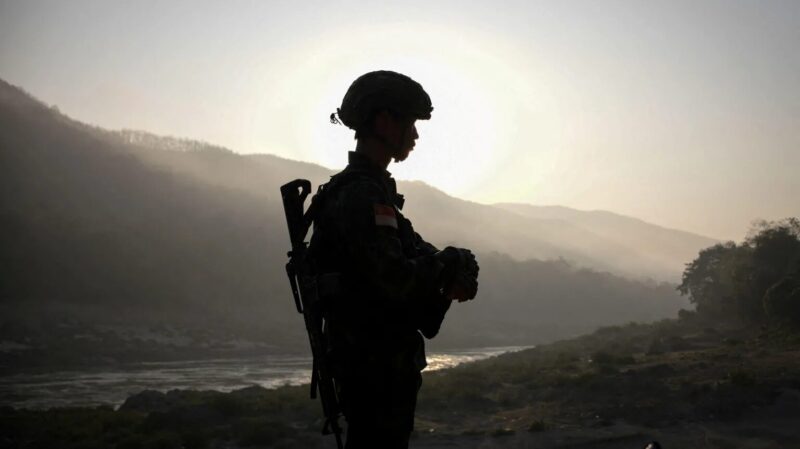
'I was completely out of my mind'
In July, Chaw Su received a call from her husband who was one of two men from their village sent for training.
He told her he had been deployed to Karen state, where some of the most intense fighting between the junta and ethnic armed groups was taking place.
"He said that he would be sent to the frontline for two weeks and that he would call me when he returned to base," Chaw Su tells the BBC. "It was the first and last message I received from him."
At the end of July, a military officer called to inform Chaw Su her husband was dead.
"I was completely out of my mind. The officer tried to console me with his words, but I felt that my life was over."
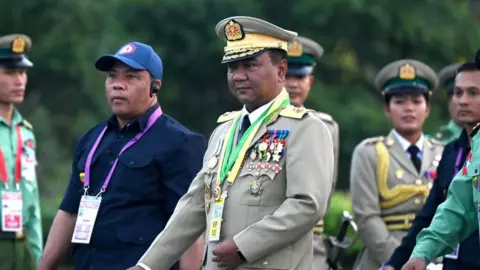
Like many others, Chaw Su was promised a salary for her husband's service, but she claimed she only received 70,000 kyats (around $21) from the village official when her husband was first conscripted.
After the initial payment, months went by without any financial support.
The military says conscripts are entitled to salary and compensation upon death in service, as with full-rank soldiers. But junta spokesperson Major General Zaw Min Tun told the BBC "there could be a delay if the necessary documents are incomplete".
Across Myanmar, conscripted soldiers - often untrained and unprepared - are sent to conflict zones with little support. Their families are often left in the dark about their whereabouts.
Soe Soe Aye, a widow in her 60s, has been left without word from her son, who was conscripted six months ago. She says he had no desire to serve in the military.
"[My son] joined the military to feed his mother," she adds tearfully. "I regret letting him go."
Now, she struggles with poor health and depends on her youngest daughter to support their household. But she is trying to remain hopeful.
"I just want to see my son. I don't have enough strength to face this."
'I hated the army even more'

Many young Burmese have taken drastic measures to resist the conscription order.
Kan Htoo Lwin, a 20-year-old from Myannmar's commercial hub, Yangon, was conscripted and trained for three months along with 30 others.
He says the training was gruelling and they were threatened that if anyone tried to escape, their homes would be burned.
"After the training, I hated the army even more," he says.
During a journey to the frontline in the eastern part of the country, Kan Htoo saw a chance to escape with two others when their convoy stopped halfway.
"We ran once it got dark, while they were busy with security checks. We didn’t stop until nightfall," he recalls. "At some point we were exhausted and stopped to rest. We took turns sleeping and keeping watch."
At dawn, the three young men hitched a ride from a truck driver and made it to Aung Ban, a township in the southern Shan state. Here, Kan Htoo joined a PDF, one of the many resistance groups that have been growing as more young people, disillusioned with the military junta, take up arms.
The other two men are currently in hiding, Kan Htoo says. For safety reasons, he doesn’t want to reveal what they are doing now.
'It's hard to explain my struggle'
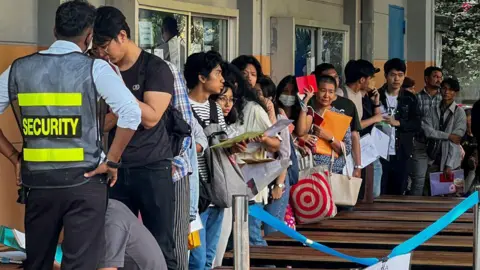
While men have been the primary focus of the conscription efforts, women have also been affected.
Zue Zue, a 20-year-old from Yangon, abandoned her dream of becoming a Chinese translator to join the Special Operation Force (SOF), a unit within the PDFs.
"Now my goal is to end this era of military dictatorship and make peace for our generation," she tells the BBC.
While Zue Zue chose to stay, others have fled the country.
Engineer Min Min left for Thailand when conscription began. He’s now staying there on an education visa, but claims he has been struggling to find legal work that suits his qualifications in Bangkok.
Many who flee to Thailand, like Min Min, end up in low-wage jobs. Thai authorities have also become stricter in catching illegal migrants, and many are now facing deportation if caught.
Min Min worries that when his visa expires, he will have to stay illegally in the country.
"I’m worried about the living costs," says the 28-year-old. "I have no choice but to find manual labour jobs."
He also says priority is given to Thai nationals, whose rights are protected, while Thai business owners often exploit migrants working illegally.
"I have also seen that Burmese engineers are working illegally and only paid around 12,000 Thai baht ($355), similar to the salary of migrant manual workers," he says.
Back in Myanmar, Chaw Su now works odd jobs in the village, earning barely enough to feed her children.
"It’s hard to explain to other people the struggle I'm going through," she says.
Latest Stories
-
Egypt’s Al-Ahly part ways with coach Koller
33 minutes -
Rafatu Inusah elected onto GOC Board
3 hours -
SAMSON’S TAKE: AG okays demo, how refreshing?
3 hours -
Trump questions Putin’s desire for peace after meeting Zelensky at the Vatican
4 hours -
Legend of The Week – George Darko
5 hours -
Kounde strike wins Copa del Rey final for Barcelona
10 hours -
Is NPP crying more than the bereaved in the Chief Justice saga?
11 hours -
“Elements within NPP worked against me for supporting ‘Ken must go'” – Cynthia Morrison
12 hours -
IMF Boss commends finance minister for strong commitment to economic reform
12 hours -
Cynthia Morrison advises Ghanaian women to diversify their skills to build wealth
12 hours -
UK deports 43 immigration offenders to Ghana and Nigeria
13 hours -
Piwak Natural Health urges Akosombo victims to rebuild with new donation
13 hours -
Ghana’s Para athlete Gilbert Ampiah wins bronze at Marrakech Grand Prix 2025
13 hours -
6 dead in Adansi Dompoase crash involving VIP bus and sprinter
14 hours -
Saturday’s heavy rainstorm caused outages within our network – ECG
14 hours

